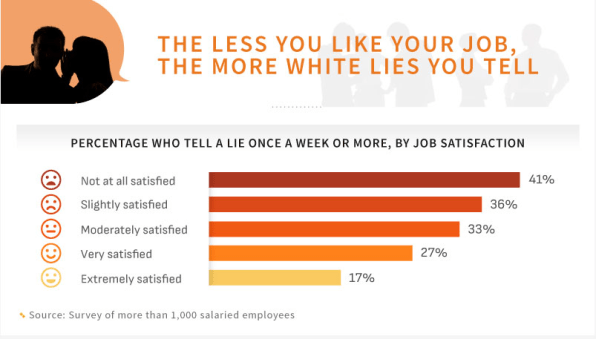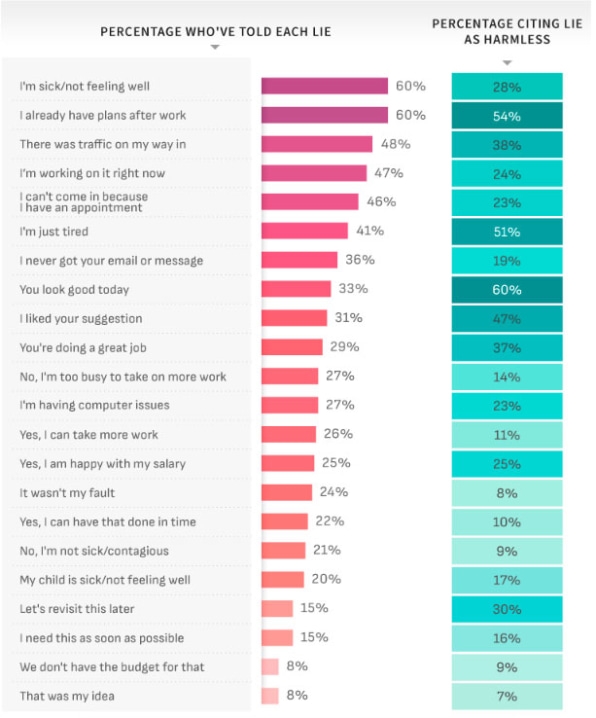What the lies we all tell at work say about us
Natalie St. John considers herself an honest employee, as long as you don’t include a two-year period that ended in 2017.
At the time, the now-29-year-old makeup artist was working for a major cosmetics brand as infamous for their strict workplace policies as they are for pursuing legal action (which is why she’s requested that the company’s name not be included in this article).
While working for this company part-time, she admits, she told just about every lie in the book, from faking a personal illness to lying about a loved one’s death. She even once faked a doctor’s note to get out of work.
While she was only employed for 15 hours a week by this brand, however, she was expected to be available at all times. St. John says the company refused to accommodate the most basic scheduling requests, even threatening employees with termination if they complained about their schedule.
“In a normal circumstance they weren’t things I’d have to lie about,” says St. John, adding that she was working multiple jobs at the time. “I was trying to strike a balance, and sometimes you need to lie to get that balance.”
According to a recent study by online employment and recruitment resource SimplyHired, St. John is far from alone in telling the occasional lie at work. Furthermore, the frequency and severity of those falsehoods are often correlated with overall workplace satisfaction. Those who consider themselves honest people are more likely to lie when they feel their employer isn’t being fair or accommodating.
A canary in the coal mine?
According to the study, the most common lies uttered at work are “I’m sick” and “I already have plans after work,” which 60% of the study’s 1,000 respondents admitted to using. Other common lies include “There was traffic on my way in,” “I’m working on it right now,” and “I can’t come in because I have an appointment,” all of which had been used by just under half of study participants.
The study also found that only 17% of those who are extremely satisfied and 27% of those who are very satisfied with their jobs lie once a week or more. By comparison, 36% of those who were only “slightly satisfied” and 41% of those who are not at all satisfied admitted to lying weekly or more.

“There really was a clear trend between how frequently people tell white lies and their job satisfaction,” says Joey Morris, a project manager for SimplyHired and author of the study.
The study also asked participants to rank the severity of each lie they told at work and found that those who are unsatisfied with their jobs tell more harmful lies in the workplace. The most common lies told by those who are unsatisfied with their jobs include “I never got your message,” “It wasn’t my fault,” “I’m having computer issues,” and “I’m too busy to take on more work.” In each case, a majority of the participants ranked those lies as harmful.
By contrast, those who are most satisfied with their jobs are far more likely to falsely tell their colleagues “I already have plans after work” or “You look good today,” which a majority of participants considered harmless.

Those caught lying at work are often considered bad employees, but, according to the study, their fabrications may be more telling of their sentiments towards their employer than their personality.
“If you’re a supervisor and you notice white lies coming from your team, that might be a sign they’re unsatisfied,” explains Morris. “If you find yourself telling more yourself, that might be a sign that you’re unsatisfied or stressed out at your current role.”
Some workplaces breed a culture of dishonesty
David Shulman, professor of sociology at Lafayette College and author of From Hire to Liar: The Role of Deception in the Workplace, puts more blame on the workplace and culture than the individual. He explains that when people’s options are limited, they often feel they have to lie in order to get what they want.
“Lying is a tool people can use when they don’t have the power otherwise to fix a situation to their liking,” he says. “People lie because lies can work, when abiding by normal rules or etiquette fall short in getting a person what they want. That could be why more-dissatisfied people lie.”
Shulman, however, suggests that some of the best liars make the most satisfied employees, assuming they find an organization that is willing to forgive or even celebrate their ability to fabricate the truth.
“I think maybe some of the most successful people are those who have lied their way into success,” argues Shulman. “In other words, you’ve got the disgruntled people [who lie frequently], but that doesn’t mean the people who are happy generally are [more honest].”
Lies vary by age, gender, position, and day of the week
The SimplyHired study also found that the frequency and type of lies one tells at work might be a function of their age, gender, their position in the company, or even the day of the week.
For example, the older you are the less likely you are to lie in order to skip work. Lying is also most frequent on Mondays and Fridays, which Morris says is “likely to do with people trying to extend their weekend by a day or two.”
Those in more senior positions also admitted to lying more frequently, with 37% of managers lying more than weekly, compared with 30% of associates and 28% of entry-level workers. “Just the nature of being a supervisor or manager and having to report to additional contacts might be influencing higher rates of frequency,” suggests Morris.
The study also found that men lie more than women, particularly when it comes to improving their chances of receiving a raise or avoiding being reprimanded for a mistake. Women were instead more likely to lie in order to avoid hurting a coworker’s feelings or to attend a job interview without notifying their current employer.
You get what you give
Shulman takes issue with the fact that the study only considers the lies employees tell to their bosses, arguing that employers are often equally guilty of bending the truth. For example, candidates are often criticized for fabrications on their résumés, yet employers are often equally guilty of fabricating in job postings.
“If they actually want to recruit you, they’ll make it seem like paradise,” he says. “Then people get there and they’re not getting to do the kinds of things they were told they’re going to do,” leading them to lie in order to get what they want.
Such was the case for St. John, who felt justified in bending the truth when dealing with what she felt was a dishonest organization. “If I felt like I could go to management and say, ‘Guys, I really need this day off,’ and they would listen to me and give me a valid reason for saying ‘No,’ of course I would be honest,” she says. “But they didn’t, so I had no choice but to lie.”
(52)



